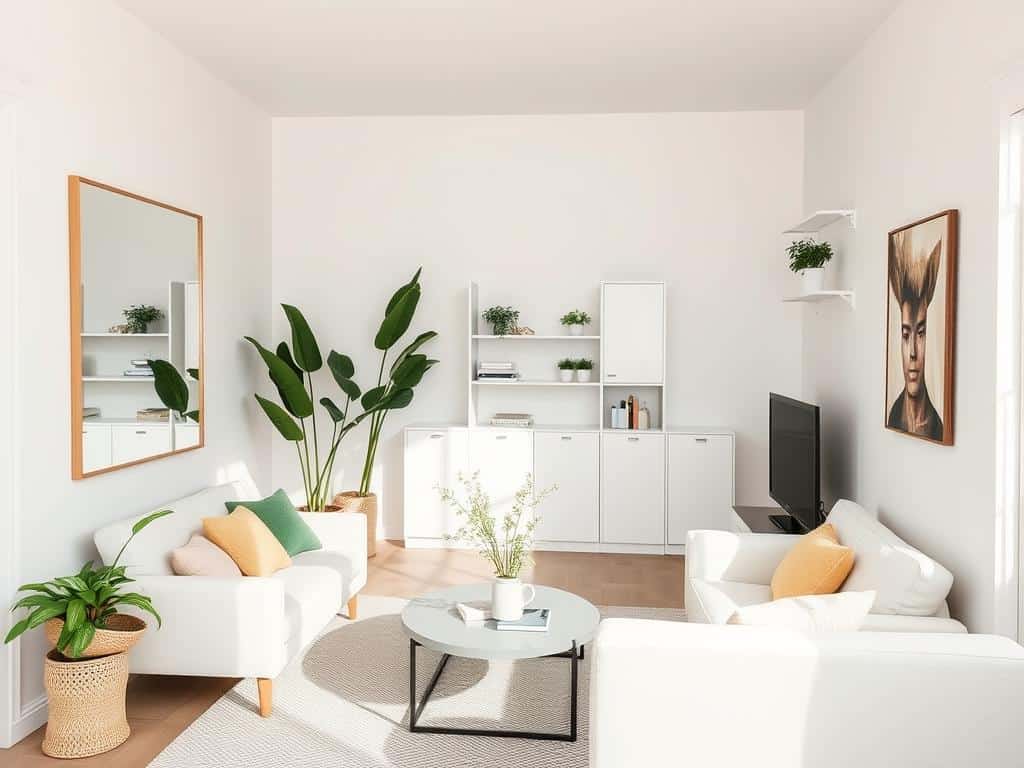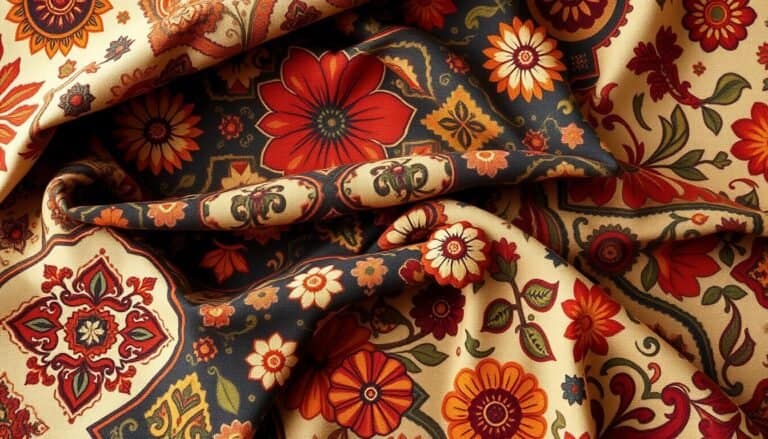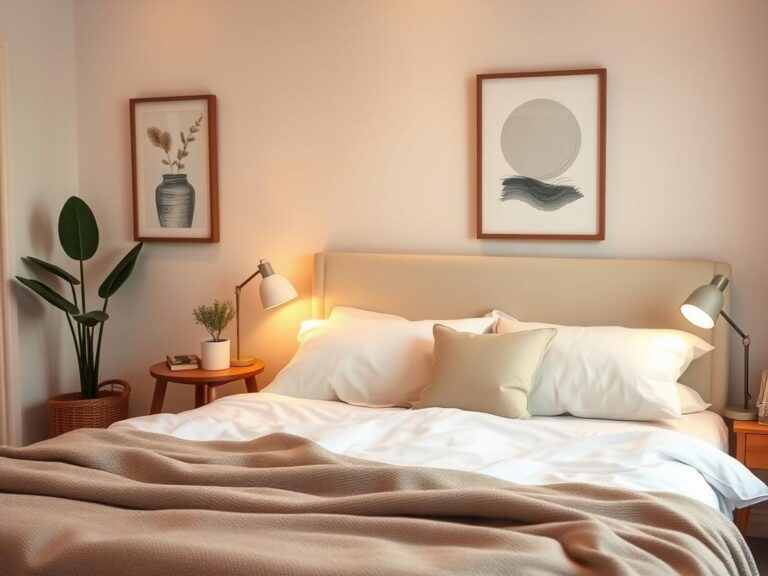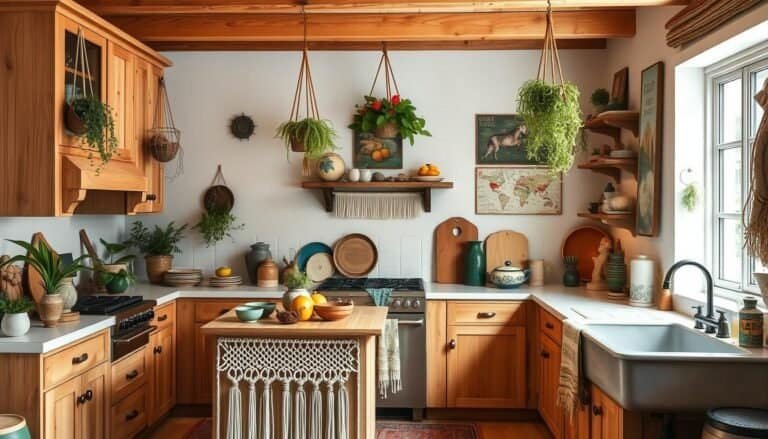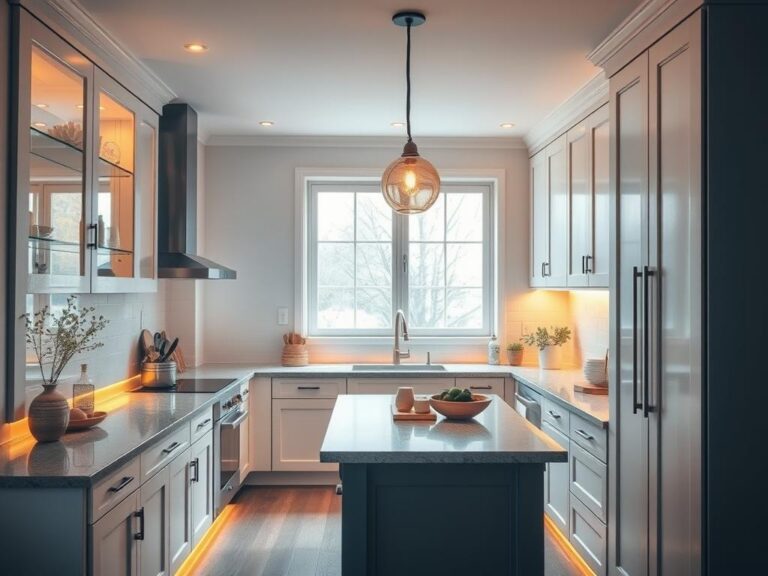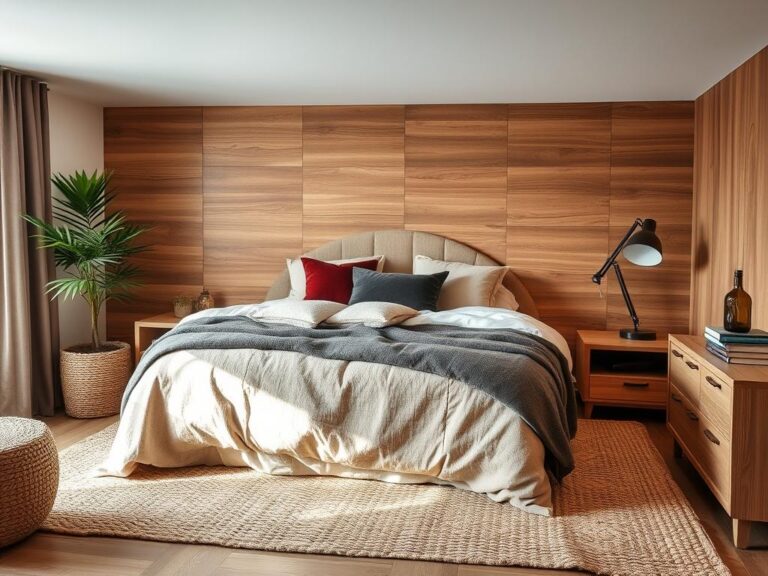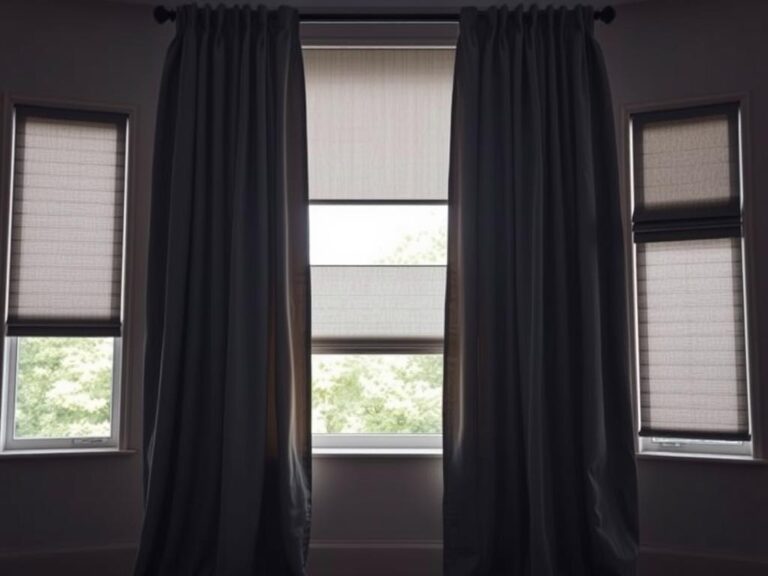18 Home Decor Ideas That Make Small Spaces Look Bigger
This post may contain affiliate links which means I may receive a commission for purchases made through links at no extra cost to you. I only recommend products I truly believe in. Thank you for your support!
Turning small spaces into big ones is a big challenge. But, with smart ideas, you can make even tiny areas feel big and welcoming. Using light colors, picking the right furniture, and planning space well can do wonders.
Try using light colors on walls and floors to make rooms look bigger. Also, keep furniture off the floor and get rid of clutter. This makes rooms look clean and open.
Using the same colors and flooring in different rooms makes them feel connected. Cool colors on walls make them seem to fade away. Simple changes can make small spaces feel bigger and more welcoming.
Key Takeaways
- Maximize the illusion of space through strategic use of light colors and minimalist furniture
- Utilize vertical space with shelving and hanging decor to create a sense of height
- Incorporate mirrors to reflect light and amplify the perception of depth
- Declutter and organize for a clean, uncluttered look that expands the visual field
- Employ area rugs and textiles to define distinct zones within small rooms
1. Understanding the Illusion of Space
Creating a bigger space is all about visual tricks. These tricks make a room seem bigger than it is. Light plays a big role in this magic.
What Is Spatial Illusion?
Spatial illusion is when design tricks our eyes and brain. It makes a room seem bigger. Designers use color, lighting, and furniture to do this.
How Light Affects Perception of Size
Good lighting makes a room feel bigger. Well-placed lighting can make a room feel brighter, airier, and more open. Using natural light and smart light placement helps too.
Knowing how light and design work together is key. It helps make small spaces feel bigger. Designers and homeowners can make small rooms look big and welcoming.
2. Choosing the Right Colors for Small Rooms
Choosing colors for small spaces is very important. Colors can make a room look bigger or smaller. Knowing about color psychology helps make small rooms look bigger.
Light Colors vs. Dark Colors
Light colors make rooms feel open and airy. Soft white, pale gray, or light beige reflect light well. This makes the room look bigger and brighter.
Dark colors add coziness and depth, great for rooms with little light. But, they can make rooms feel smaller if not used right.
Accent Walls: Maximizing Impact
An accent wall adds interest and depth to small rooms. Painting one wall a bold color draws the eye. This makes the room look bigger and more interesting. 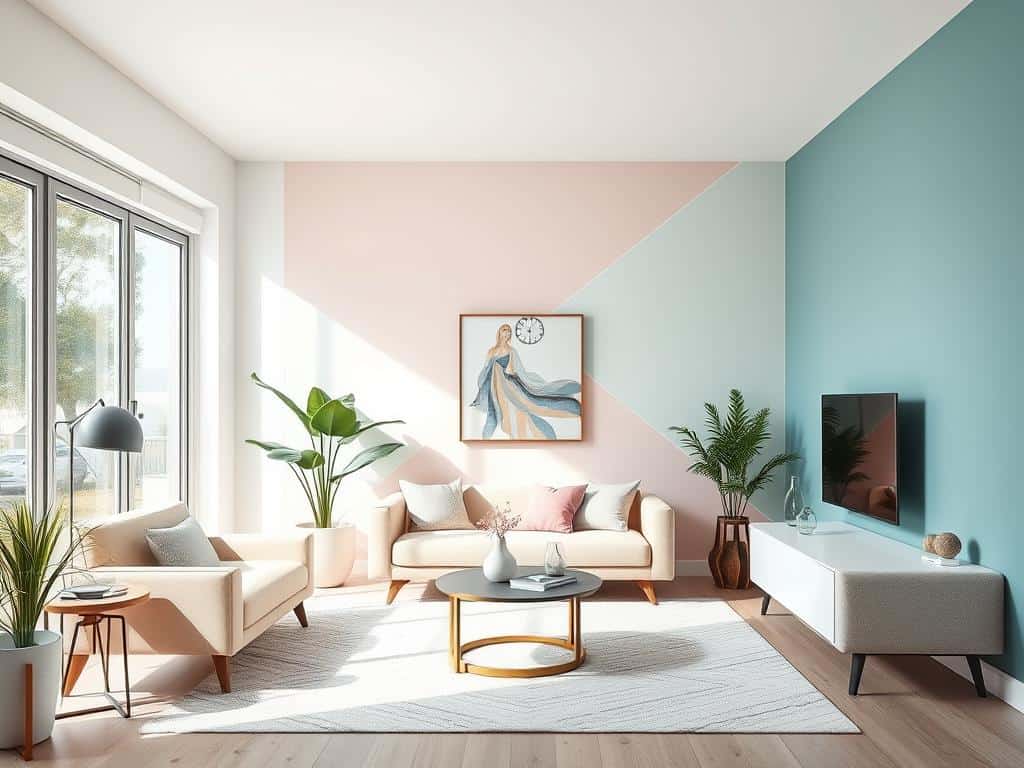
Using bold colors like deep blues or greens on an accent wall is great. It contrasts well with other walls.
Choosing the right colors and using accent walls can change how small rooms look. They can feel more open and appealing.
3. Furniture Selection Strategies
Choosing the right furniture is key for small spaces. Pick pieces that do more than one thing. This makes your space look bigger and more open.
Multi-Functional Furniture
Look for furniture that does double duty. An ottoman can be a coffee table or a place to sit. Storage benches offer both a seat and a place to store things. These items help use every inch well, keeping your space tidy.
Scale Matters: Sizing for Small Areas
In small rooms, big furniture is better than lots of small pieces. Big furniture makes a room feel open, not cramped. Furniture with exposed legs makes rooms look bigger and airier.
Think about using space-saving items like Murphy beds or folding tables. These can be hidden away when not needed. They help you use your space better.
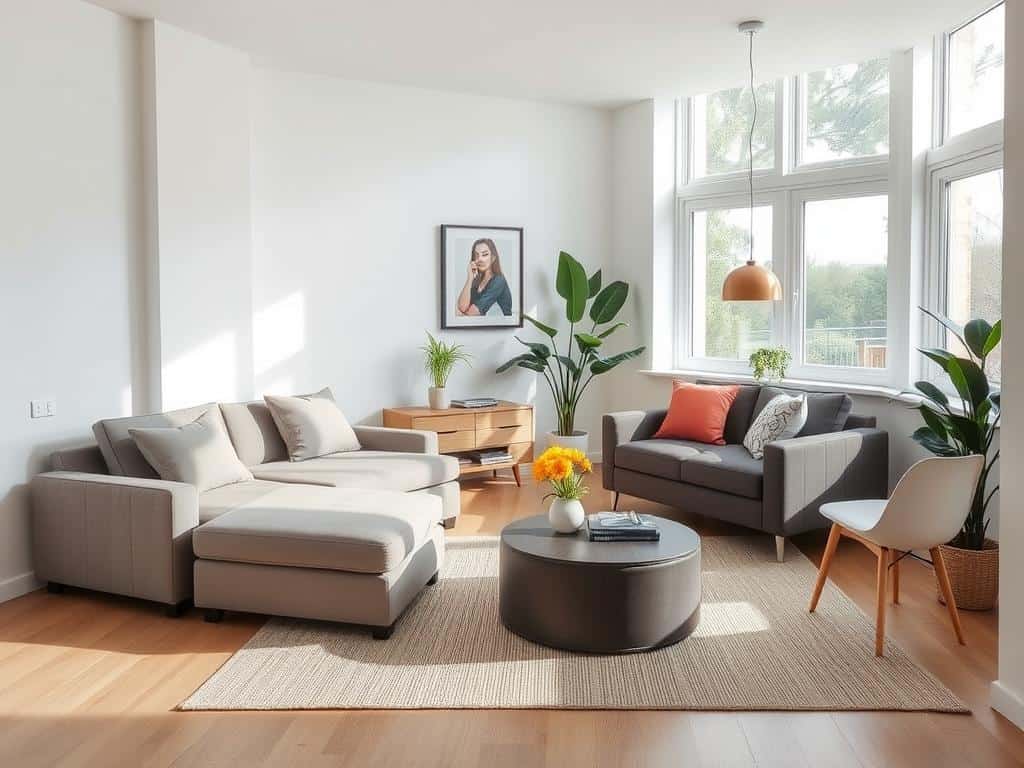
“When it comes to small spaces, the key is to choose furniture that maximizes utility without overwhelming the room. Multifunctional pieces and properly scaled items can work wonders in creating the illusion of a larger, more open environment.”
4. Utilizing Vertical Space Effectively
In small spaces, using vertical space is key. You can make a room look bigger by using all the height. Options like floor-to-ceiling bookshelves and wall-mounted shelves help a lot.
Shelving Solutions
Bookshelves that go from floor to ceiling catch your eye and make the room seem taller. Wall-mounted shelves save floor space. They’re great for books, decor, and collectibles, keeping things tidy.
Hanging Decor for Height
Hanging things like plants, artwork, or lights makes a room feel taller. These items pull your gaze up, making the space seem bigger. Also, using vertical stripes in wallpaper or paint can make ceilings look higher.
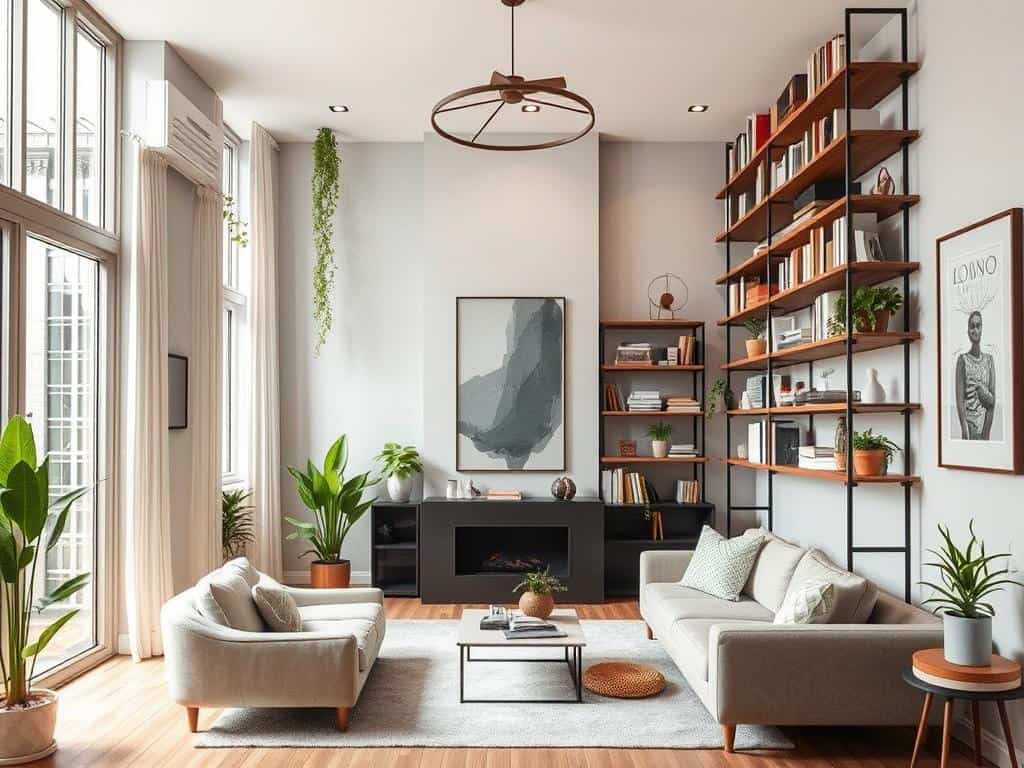
Using every inch of walls and ceilings is key in small spaces. It turns tiny rooms into cozy and nice places. So, get creative and use your vertical space well!
5. Mirrors: The Ultimate Space Expander
Mirrors are great for making rooms look bigger. They reflect light and views, making spaces feel larger. This trick works well in small rooms.
Where to Place Mirrors
Put mirrors opposite windows to get more light. This makes rooms look deeper and wider. Grouping small mirrors or using a big, frameless one also helps.
Types of Mirrors That Work Best
For small spaces, pick the right mirror. Frameless mirrors are best because they look smooth. Mirrored furniture and shiny surfaces also make rooms feel bigger.
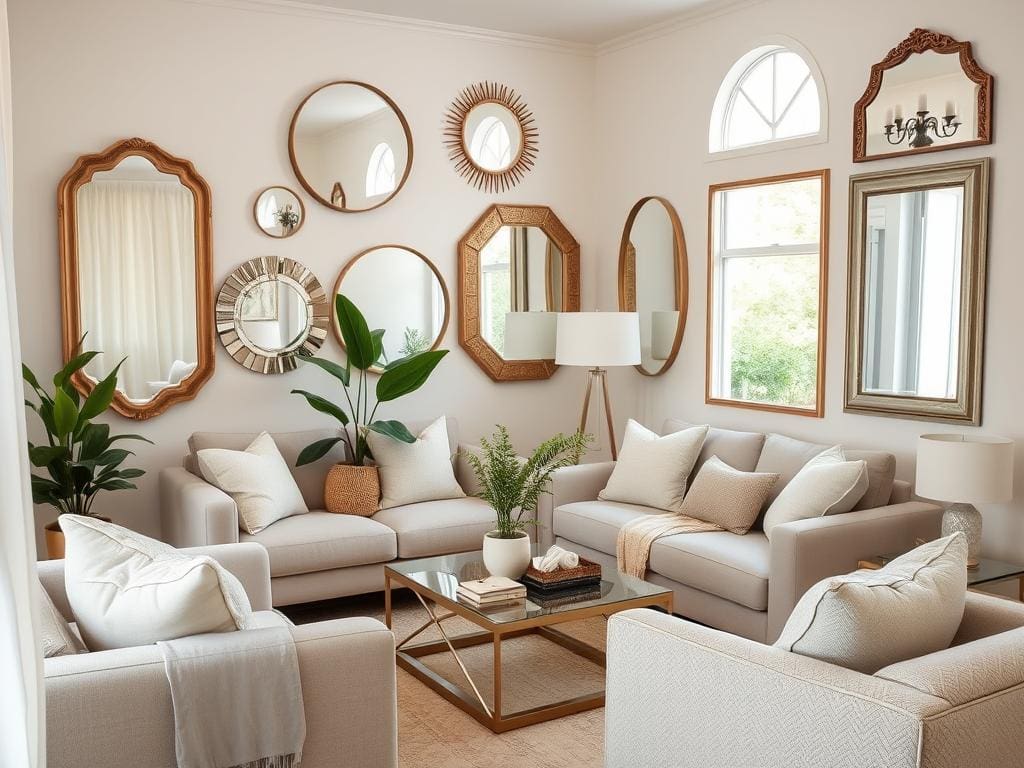
“Mirrors are the ultimate tool for creating the illusion of space. Their strategic placement can transform even the smallest of rooms into a bright, airy oasis.”
Big mirrors or many small ones can make any room feel welcoming. Learning about mirror tricks and reflective surfaces helps use mirrors to their fullest.
6. Smart Lighting Choices
Good lighting makes small spaces look bigger. Use smart lighting to make rooms feel deeper and wider. Mix ambient, task, and accent lights for the best effect.
Layered Lighting Techniques
Ambient lighting gives a soft glow to the whole room. Use ceiling lights or wall sconces for this. Task lighting, like pendant lights, shines on work areas. Accent lights, like spotlights, highlight special features.
Combining these lights makes a room feel bigger and more welcoming. Try dimmers to change the light’s mood.
Natural Light Enhancement
Letting in natural light is key. Keep windows clear and use light curtains. If light is scarce, add more lights to brighten up.
Wall sconces or pendant lights are great for saving space. Try different spots and heights for a nice look.
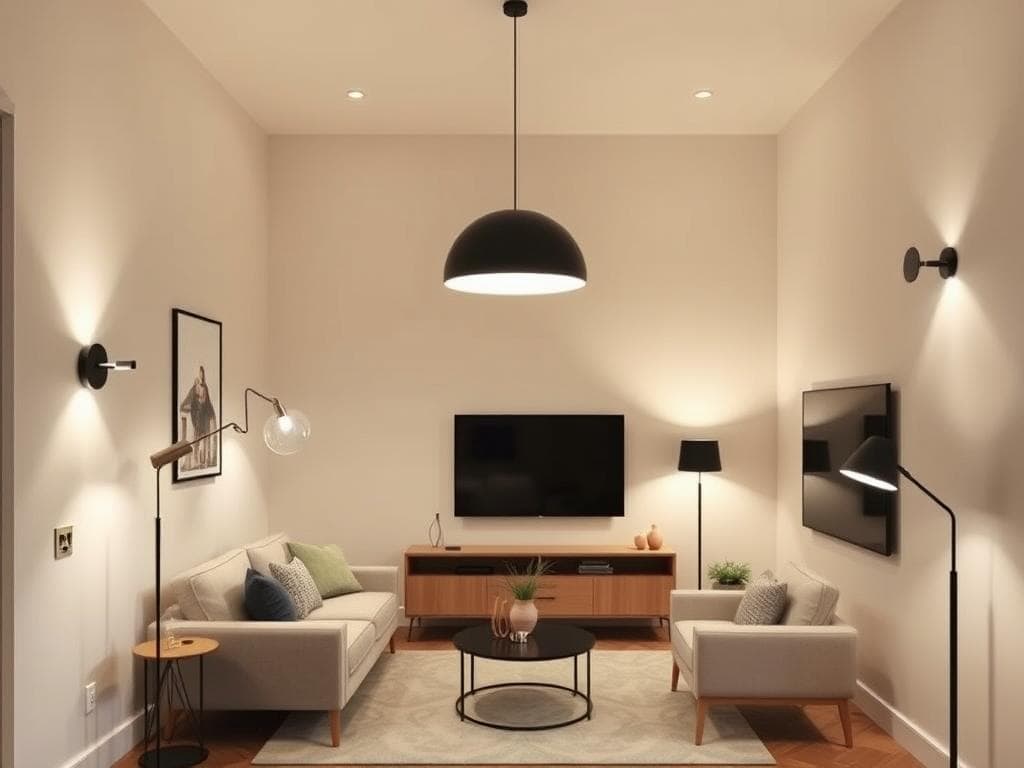
“Proper lighting is key to creating the illusion of a larger, more open space. By layering different types of lights and enhancing natural light, you can transform even the most compact room.”
The right lights can change how a small space feels. Use lighting design, natural light maximization, and artificial lighting to make it cozy and big.
7. Decluttering for a More Open Feel
Decluttering makes a small space feel cozy and open. By getting rid of unused items, you make your room feel bigger. This simple step can make your room feel less cramped.
Organizing Strategies
Keeping things organized is key for a clean small space. Use hidden storage like under-bed containers. This keeps things out of sight.
Organize your stuff by grouping similar items. Make sure everything has a home. This makes your space look better and helps you find things faster.
Minimalism: Less Is More
Minimalist design means only showing what’s important. Minimalist design makes your space feel calm and open. Choose items that are useful or special to you.
By having fewer things, your space will feel cleaner and more peaceful. This turns your small space into a cozy, organized place.
| Decluttering Tip | Benefit |
|---|---|
| Regularly review and discard unused items | Reduces visual clutter and creates a more spacious feel |
| Utilize hidden storage solutions | Keeps belongings out of sight, maintaining a clean and organized appearance |
| Embrace minimalist design principles | Fosters a sense of calm and openness by focusing on the essentials |
“The true essence of a minimalist home is not the lack of stuff, but the abundance of space.”
8. Rugs and Textiles: Creating Zones
Small spaces can look bigger with the right rugs and textiles. Area rugs help make a room feel bigger and more connected. They make the space look like one big area.
Area Rugs to Define Spaces
Choosing the right area rug is key for small rooms. Big, simple rugs work best. They keep the room clean and make it feel bigger.
Make sure the rug covers most of the floor. This makes the room feel bigger.
Textiles That Add Depth
Textiles add depth and interest to small spaces. Use light fabrics for curtains, like linen or sheers. This keeps the room feeling open.
Throw pillows and blankets add coziness. But don’t overdo it to avoid clutter.
Area rugs and textiles help define zones, create visual depth, and make small spaces feel more inviting and spacious.
| Rug Placement Tip | Textile Choice Advice |
|---|---|
| Ensure the area rug covers a significant portion of the floor to unify the space. | Opt for lightweight, airy fabrics like linen or sheer curtains to maintain an open feel. |
| Choose large, simple-patterned or solid-colored rugs to avoid visual clutter. | Strategically place throw pillows, blankets, and other soft furnishings to add depth and warmth. |
| Positioning the rug at an angle can create a dynamic look and make the room appear larger. | Vary textures through textiles to add visual interest without overwhelming the space. |
Mastering area rug placement and textile choices can zone your small spaces. It makes them feel bigger and more welcoming.
9. Creative Wall Decor Ideas
Wall decor can change how we see a room. It can make small spaces look bigger. Let’s look at some creative ideas for wall decor.
Floating Shelves vs. Traditional Shelves
Floating shelves are great for small spaces. They offer storage and display without taking up much room. They look sleek and modern.
Traditional shelves can make a room feel cluttered. Floating shelves are a better choice for keeping your walls open.
Gallery Walls: A Cohesive Look
Gallery walls add personality and interest to your walls. In small spaces, it’s key to keep the look cohesive. Choose frames and art that go well together.
Arrange them in a way that looks good. Use a few big pieces instead of many small ones. This helps keep the space feeling open.
Using wallpaper or painted patterns on the ceiling can also help. It makes the room feel taller. Try light patterns or a bold design to add depth.
The secret to great wall decor in small spaces is balance. With the right decor, even tiny areas can look big and beautiful.
10. Plants: Adding Life and Depth
I love plants and how they change small spaces. They bring natural beauty and make rooms feel bigger. Plants like vertical gardens and succulents can make your home feel new.
Best Plants for Small Spaces
Choosing the right plants for small rooms is important. Look for ones that grow well in little light and don’t take up too much space. Aroids, Philodendrons, and Ficus Deltoidea are great for small spaces.
Chinese Evergreens, Scindapsus Treubii Moonlight, and ZZ Plants are also good. They are strong and look beautiful.
Using Plants to Enhance Space
Using vertical space is key for plants in small rooms. Vertical gardens and wall planters save floor space. They bring nature to your walls.
Hanging plants like Spider Plants and String of Pearls add depth. They make corners look softer and add fun to your plant decor. A big plant can make a room feel bigger.
“Plants not only add life to a room, but they can also make a small space feel more open and airy.”
Choosing the right plants and using vertical space is key. With a little creativity, your small home can become a green oasis. It will feel bigger than it is.
11. Final Touches: Accessories That Pop
Decorative accessories can really change a small space. Instead of using many small items, pick a few big ones. These can make the room look better.
Look for shiny or metallic things. They can make the room look bigger by bouncing light.
Choosing the Right Accessories
Choose accessories that are both useful and stylish. Clear or lucite items keep the room feeling open. They don’t take up much space.
Adding personal items like photos or art makes the space special. It shows who you are without making it too busy.
Personal Touches That Expand Perception
Adding personal touches makes a small space feel welcoming. Things like decorative trays or candles can make areas in the room stand out. They make the room look bigger.
By placing these items well, you can make the room seem bigger. It’s like magic!
FAQ
What is spatial illusion?
How does light affect the perception of space?
What are the differences between light and dark colors in small spaces?
How can multi-functional furniture help in small spaces?
What are some effective ways to maximize vertical space?
How can mirrors be used to create the illusion of space?
What is the importance of proper lighting in small spaces?
How can decluttering help make a small space feel bigger?
How can rugs and textiles define areas in a small space?
What are some creative wall decor ideas for small spaces?
How can plants enhance the feel of a small space?
What types of accessories work best in small spaces?
Source Links
- 18 Ways to Make a Small Space Look Larger
- These Clever Small Home Ideas Make the Most of Every Room
- How to Make a Small Space Look Bigger | 7 Easy Tips
- 21 Designer-Approved Tricks for Making a Small Living Room Feel Elevated | Havenly Blog
- These Paint Colors Can Make Small Spaces Appear Way Larger
- 44 Small Living Room Ideas That Maximize Style and Storage
- Choosing Colour Schemes for Small Spaces | Little Greene
- 23 Clever Small Room Ideas to Make a Space Look Bigger
- 36 Decorating Ideas for Apartments That Make Small Rooms Seem Bigger
- 35 Small Living Room Ideas To Make Your Space Seem Bigger – House Digest
- 12 Innovative Small Apartment Ideas for Maximizing Space
- 20 Incredibly Clever Ways to Decorate with Mirrors in a Small Living Room — Michael Helwig Interiors
- 37 Small Living Room Ideas for a Cozy Common Area
- 40 Small Apartment Living Room Ideas to Maximize Space and Style
- 32 Styling Tricks That Will Make Your Small Living Room Feel Bigger and Better
- 31 Clever Ideas For How To Make A Small Room Look Bigger
- Tips to Make a Room Seem Bigger | PODS Moving and Storage Blog
- 60 Small Living Room Ideas That Make the Space Feel Larger
- Small Space Decorating Ideas (How To Make A Small Room Look Bigger) – From House To Home
- The Right Rug Can INSTANTLY Transform Your Bedroom. Designers Show Us How
- 39 Wall Decor Ideas to Bring Your Space to Life
- How To Decorate A Blank Long Living Room Wall
- 24 Beautiful Houseplants That Are Perfect for Apartment Living
- 21 Small Indoor Plants for Apartment Living
- 65 Easy and Chic Home Decorating Ideas From Designers
- 26 Stylish Solutions for Those Awkward Spaces You Don’t Know What to Do With
- 25 Minimalist Decor Ideas to Try At Home
